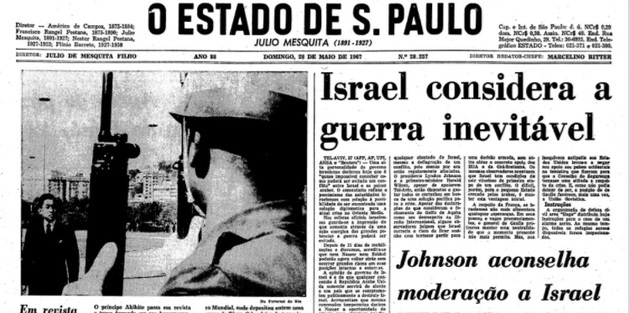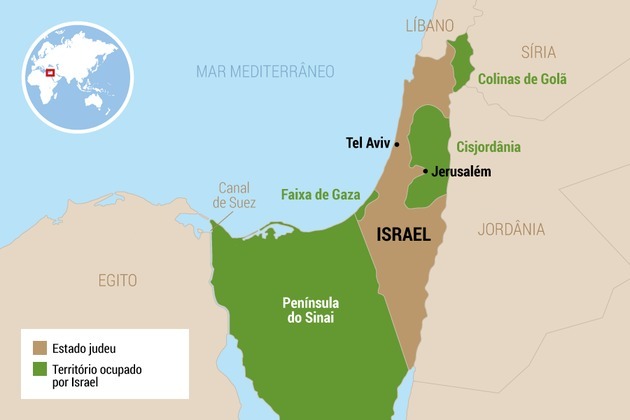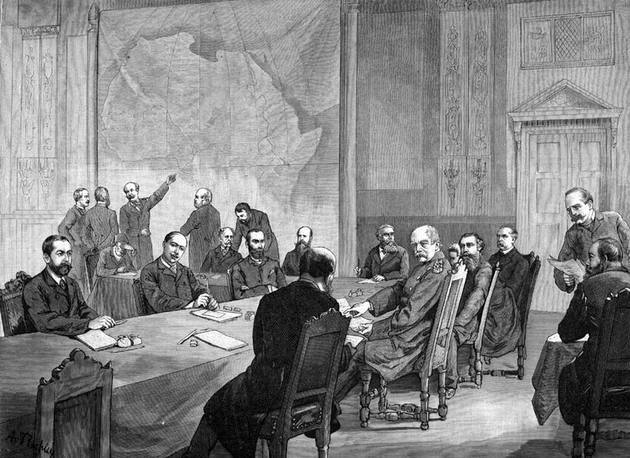THE Six Day War, called by the Arabs of"June War" or"Third Arab-Israeli War", took place between the 5th and 10th of June 1967.
The conflict involved Israel, Egypt, Syria and Jordan. As the winner, Israel incorporated the areas of the Sinai Peninsula, the Gaza Strip, the West Bank, the Golan Heights and the eastern area of the city of Jerusalem.
The annexation of these territories stirred up the spirits between Jews and Arabs in Palestine.
War Background
In 1945, the Arab countries had formed an alliance among themselves, the Arab League, which asserted if Israel would attack any Arab country like Egypt, Syria, Lebanon and Jordan, etc. everyone should retaliate for the offense.
Likewise, Egypt, ruled by Gamal Abdel Nasser (1918-1970), was militarily preparing to attack the State of Israel. To increase regional tension, in 1964 the Palestine Liberation Organization (PLO) was created, an entity that would be responsible for conducting the policy of the Palestinian territories.
In addition, Egypt expelled United Nations troops, the blue hulls, from the Sinai Peninsula, prompting the Israeli armed forces to prepare for a possible attack.
Causes of the Six Day War

Since the creation of the State of Israel in 1948, neighboring Arab states have threatened to end the newly founded Jewish state, and tension has been constant.
The justification for the conflict, initiated by Israel, was the anticipation of a possible Arab invasion. The attack would be a preventive response to the offensive that took place on May 14, the anniversary of the founding of Israel.
Development of the Six Day War
Despite wanting to avoid fighting on three fronts, Israel found itself attacked by Egypt, Syria and Jordan. First, Syrian planes invade Israeli airspace and are shot down.
At the time, Egypt concentrated troops on the Syrian border in a clear show of dissatisfaction with the Jewish occupation of Palestine.
In addition to the displacement of troops, Egypt blocked the Strait of Tiran in the Red Sea, which prevented Israeli access to the Indian Ocean.
So, on June 6, the Israeli Air Force attacked Egypt with its planes and managed to destroy the military aircraft and airports in just 8 hours.
On the other hand, in Jordanian-dominated East Jerusalem, there were three days of fighting, with the Israeli victory seizing this part of the city.
After four days of this action, Syria concentrated its armies on the Golan Heights. Troops from Arab countries were decimated within hours of the first attack, initiated by Israel.
Although they also responded to the attacks, the Arab armies were unable to react to Israel's military superiority.
On June 7, the Security Council of the UN (United Nations) called for a ceasefire, which was immediately accepted by Israel and Jordan. Egypt accepted the next day and Syria did so on June 10th.
Six Day War Chronology
See below the chronology of the dispute:

Aftermath of the Six Day War
The Six-Day War left thousands dead, especially among the Arab forces, which were backed by reinforcements from the Saudi Arabia, Algeria, Iraq, Libya, Morocco, Sudan and Tunisia.
Egypt recorded 11,000 deaths, Jordan 6,000, and 1,000 casualties were recorded on the Syrian side. For its part, Israel had 700 dead in combat and 6,000 prisoners.
In the long run, the Six Day War marked a new phase in the conflict between Jews and Palestinians, as Palestinians began to become aware of their own strength and identity.
On the other hand, hundreds of thousands of Palestinian refugees have come to live in occupied territories under Israeli rule.
Territorial Expansion

With the victory in the Six Day War, the State of Israel incorporated:
- Gaza Strip and the Sinai Peninsula;
- Golan Heights;
- West Bank, including the eastern portion of Jerusalem.
Jerusalem situation
Before the war, Jerusalem was divided between Arabs and Israelis, within the partition carried out by UN determination in 1948.
Now, Palestinians are demanding the return of the city, which is considered sacred to Muslims, Jews and Christians.
For Jews, Jerusalem is an indivisible territory and capital of the State of Israel by law. However, for all intents and purposes, the city of Tel Aviv is the de facto capital of Israel.
The ownership and possession of Jerusalem is one of the main points of conflict in Palestine.
Read too:
- arab culture
- Muslim culture
Miracles in the Six Day War
Israel's victory is considered by some religious communities as a miracle because its numerical inferiority was so evident. There were about ten Arab soldiers for every Israeli soldier.
Also during the battles of the Six Day War there were several escapes and surrenders of soldiers among the Arab armies that are considered inexplicable from a military point of view.
These stories of some supernatural intervention during the conflict fuel animosity towards Muslims around the world.
Read more about some related topics:
- War in Syria
- Middle East
- Anti-Semitism



